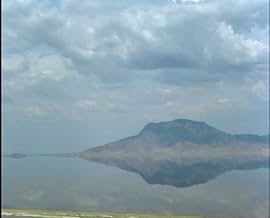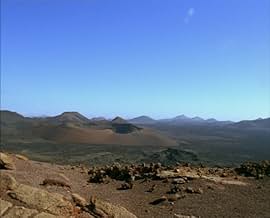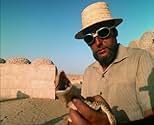VALUTAZIONE IMDb
6,7/10
4253
LA TUA VALUTAZIONE
Aggiungi una trama nella tua linguaFootage shot in and around the Algerian Sahara Desert, accompanied only by a spoken creation myth and the songs of Leonard Cohen.Footage shot in and around the Algerian Sahara Desert, accompanied only by a spoken creation myth and the songs of Leonard Cohen.Footage shot in and around the Algerian Sahara Desert, accompanied only by a spoken creation myth and the songs of Leonard Cohen.
Recensioni in evidenza
Fata Morgana is an absolute masterpiece. It's Werner Herzog's most unconventional film. It doesn't have a plot or story. Instead of a story, we're given a collection of images, words and music that work so wonderfully together. It's not a documentary either. Some of the people in this film are directed and given lines to read. It has some of the most beautiful and haunting images. Herzog shoots real mirages and we see cars and people floating around in the middle of the desert who aren't actually there but hundreds of miles away reflected like in a mirror. The use of music in this movie is so brilliant - from Leonard Cohen, Mozart, and the Third Ear Band. Imagine Stanley Kubrick's 2001: A Space Odyssey in the desert; that's what this movie is like. This film is so hypnotic that it has the ability to make you feel as though your spirit has left your body. A must see. It will change the way you view films. Rating: 10 out of 10.
Herzog has produced works of genius. That's because he has incredibly trustworthy cinematic intuition, believes in forces that called be charmed forth and is unafraid to take deep risks in his quest for the hypnotic.
He also has some interesting things to say about his work. But I advise you to _not_ listen to what he has to say because the subtlety and depth of his work is greater than his conscious insights.
A man like this constantly works/ Some of his output is well formed, others just notebooks. This is the latter. It still has moments of wonder but the scope is very local. This is a collection of short form studies. During this period, he was also writing journals, several hundred pages of cinematic notes. Next years "Wrath" was where these ideas were coherently shaped.
Ted's Evaluation -- 2 of 3: Has some interesting elements.
He also has some interesting things to say about his work. But I advise you to _not_ listen to what he has to say because the subtlety and depth of his work is greater than his conscious insights.
A man like this constantly works/ Some of his output is well formed, others just notebooks. This is the latter. It still has moments of wonder but the scope is very local. This is a collection of short form studies. During this period, he was also writing journals, several hundred pages of cinematic notes. Next years "Wrath" was where these ideas were coherently shaped.
Ted's Evaluation -- 2 of 3: Has some interesting elements.
10D Kieckh
Successful films on metaphysical subjects are rare, but Fata Morgana is a good case. You can chalk up the large subject to the ambitions of youth, but Herzog does an amazingly good job. The movie's point is to show human beings, and even the world, from a non-human point of view.
The movie is in three parts: Creation, Paradise, and The Golden Age. The imagery of each is in counterpoint to the voice-over. Although the text of `The Creation' (from the Popol Vuh, a Mayan myth) refers to the primordial wasteland, the scene goes no further in illustrating the myth. It dwells on the waste, and on various specimens of destruction (fire, smoke, wrecked vehicles). The images from `Paradise' are anything but that, and `The Golden Age' is darkly comic the highest culture is the strange roadside musical act.
The Popol Vuh suggests that mankind is the central object of creation, but the movie does everything it can to undo this notion. Its mythological framework has no referent in human historical time. There are no human characters to speak of. When a boy stands with a dog in an extended shot, the initial suggestion is of the boy's point of view; by the end it is much more the dog's. Likewise the lizard is a stronger character than the human who introduces it, and the turtle's partner barely looks human with his big flippers.
Animal stories and nature documentaries always anthropomorphize, but Fata Morgana has none of that. Certainly the dunes look like a female body, but the simile cuts both ways. Presumably only humans can distinguish easily between their creation and nature, and here airplanes and factories are presented alongside mountains, lakes, and waterfalls. People and civilization are all part of a broader natural landscape.
In 1979 Herzog put a new twist on the idea when he remade Nosferatu from the vampire's point of view.
The movie is in three parts: Creation, Paradise, and The Golden Age. The imagery of each is in counterpoint to the voice-over. Although the text of `The Creation' (from the Popol Vuh, a Mayan myth) refers to the primordial wasteland, the scene goes no further in illustrating the myth. It dwells on the waste, and on various specimens of destruction (fire, smoke, wrecked vehicles). The images from `Paradise' are anything but that, and `The Golden Age' is darkly comic the highest culture is the strange roadside musical act.
The Popol Vuh suggests that mankind is the central object of creation, but the movie does everything it can to undo this notion. Its mythological framework has no referent in human historical time. There are no human characters to speak of. When a boy stands with a dog in an extended shot, the initial suggestion is of the boy's point of view; by the end it is much more the dog's. Likewise the lizard is a stronger character than the human who introduces it, and the turtle's partner barely looks human with his big flippers.
Animal stories and nature documentaries always anthropomorphize, but Fata Morgana has none of that. Certainly the dunes look like a female body, but the simile cuts both ways. Presumably only humans can distinguish easily between their creation and nature, and here airplanes and factories are presented alongside mountains, lakes, and waterfalls. People and civilization are all part of a broader natural landscape.
In 1979 Herzog put a new twist on the idea when he remade Nosferatu from the vampire's point of view.
Fata Morgana is, by far, one of the weirdest and most perplexing art films I have ever seen. I hesitate to call it a documentary because, while is does have elements of documentation of it's images, the images themselves are so unusual, so hallucinogenic, so unclear, that I wonder whether it was really worth telling this story just so that these images can exist. The film basically is the tale of the earth and the creation of the earth shot from the perspective of an outsider, be it alien or something otherwise indescribable, all taking place in the Sahara desert. The title of the picture relates to the illusion or reflection of images, both real and hallucinated, that people in the desert often witness. These are also known as mirages.
The film opens with a plane landing followed by the plane landing again and then again and again and again and again and again and again. With each plane landing shot, the actual architecture of both the location it is landing at and the plane itself begin to slowly dissolve into one another and grow less and less real and more and more reflective imagery. The imagery in this film only grows more intense and more unusual as the picture continues. The narration of the film tells of the creation of the universe as alarming sexual images of sand and landscape move past the camera. The shots go further and further into the desert and Herzog films whatever he sees and finds. The strangest reflections of the world are on display in the distance while Herzog meets some of the most pure and photogenic collections of outsiders that you are ever likely to see. When the Leonard Cohen soundtrack kicks in, you can be sure that you are in the world of a mad man who is in love with the universe.
I cannot say too much more about this film without ruining anything, but I will say that it is a sobering experience and there's really nothing like it. I love seeing films that are just in classes of their own. This film certainly is a good example of how Herzog loves to intermingle narrative storytelling and documentary film-making into an interchangeable form. Fata Morgana unfortunately does overstay it's welcome just a bit, but by the time it nears it's end the images will most likely be burned into your mind forever. Definitely a must-see for those who are obsessed with the nature and the origin of the universe.
The film opens with a plane landing followed by the plane landing again and then again and again and again and again and again and again. With each plane landing shot, the actual architecture of both the location it is landing at and the plane itself begin to slowly dissolve into one another and grow less and less real and more and more reflective imagery. The imagery in this film only grows more intense and more unusual as the picture continues. The narration of the film tells of the creation of the universe as alarming sexual images of sand and landscape move past the camera. The shots go further and further into the desert and Herzog films whatever he sees and finds. The strangest reflections of the world are on display in the distance while Herzog meets some of the most pure and photogenic collections of outsiders that you are ever likely to see. When the Leonard Cohen soundtrack kicks in, you can be sure that you are in the world of a mad man who is in love with the universe.
I cannot say too much more about this film without ruining anything, but I will say that it is a sobering experience and there's really nothing like it. I love seeing films that are just in classes of their own. This film certainly is a good example of how Herzog loves to intermingle narrative storytelling and documentary film-making into an interchangeable form. Fata Morgana unfortunately does overstay it's welcome just a bit, but by the time it nears it's end the images will most likely be burned into your mind forever. Definitely a must-see for those who are obsessed with the nature and the origin of the universe.
I saw FATA MORGANA at its US premiere in 1972 and again in 1975. The film remained in my (inexact) memory as possible model or prototype of the "surreal documentary", and I think I had recollections of Herzog's long pans and tracking shots in a back chamber of my mind while filming material in the Dolomites that I later combined with manipulated WWI footage in my own audio-visual work GEBIRGSKRIEGSPROJEKT. Having lived in Austria for 17 years and now being fluent in the language of FATA MORGANA's narration, I was eagerly looking forward to re-encountering the film on DVD.
Unfortunately, I have to admit that I was rather disappointed. The terms of my reaction are largely defined by Werner Herzog's own commentary on the German DVD. That he wanted to make a documentary as if from the point of view of visitors from another galaxy is a good idea and a commendable ambition, but I think the hypothetical visitors from Andromeda would have arrived with a far more anthropologically organized structure of viewing than what Herzog here presents. It would however be unfair to call the film pretentious: it's just not that well thought out. There are indeed some strong images (not only those of the desert mirages ...) that could have been used effectively as expanding material in a more narratively oriented film, or served as basis for a more "experimental" work, such as those of Stan Brakhage (who Herzog professes to admire), but these images are too often weakened by sloppy camera movement or flaccid editing.
I found the use of heterogeneous music (Blind Faith, Leonard Cohen, the Kyrie from one of Mozart's masses) arbitrary and unconvincing. Chance-derived juxtapositions are stimulating now and then, but this is no well-thought-out dialectically surreal counterpoint of image and sound that could really cut into the eye and ear.
Some sequences in the later part of the film (a foreign aid worker having African children recite "der Blitzkrieg ist Wahnsinn", or a scene where German tourists hop up and down in little volcanic craters on Lanzarote) lapse into the ridiculous and unfortunately retrospectively lower the level of what came before.
BUT Werner Herzog is a great filmmaker who has in other works made immense contributions to his art. FATA MORGANA may be one of his weaker films, but I suspect it was essential to his development. I'ts a pleasure and a challenge to view and to think about this film.
Unfortunately, I have to admit that I was rather disappointed. The terms of my reaction are largely defined by Werner Herzog's own commentary on the German DVD. That he wanted to make a documentary as if from the point of view of visitors from another galaxy is a good idea and a commendable ambition, but I think the hypothetical visitors from Andromeda would have arrived with a far more anthropologically organized structure of viewing than what Herzog here presents. It would however be unfair to call the film pretentious: it's just not that well thought out. There are indeed some strong images (not only those of the desert mirages ...) that could have been used effectively as expanding material in a more narratively oriented film, or served as basis for a more "experimental" work, such as those of Stan Brakhage (who Herzog professes to admire), but these images are too often weakened by sloppy camera movement or flaccid editing.
I found the use of heterogeneous music (Blind Faith, Leonard Cohen, the Kyrie from one of Mozart's masses) arbitrary and unconvincing. Chance-derived juxtapositions are stimulating now and then, but this is no well-thought-out dialectically surreal counterpoint of image and sound that could really cut into the eye and ear.
Some sequences in the later part of the film (a foreign aid worker having African children recite "der Blitzkrieg ist Wahnsinn", or a scene where German tourists hop up and down in little volcanic craters on Lanzarote) lapse into the ridiculous and unfortunately retrospectively lower the level of what came before.
BUT Werner Herzog is a great filmmaker who has in other works made immense contributions to his art. FATA MORGANA may be one of his weaker films, but I suspect it was essential to his development. I'ts a pleasure and a challenge to view and to think about this film.
Lo sapevi?
- QuizOne of two films from 1971 to feature a trio of songs by Leonard Cohen, the other being Robert Altman's McCabe and Mrs. Miller.
- ConnessioniFeatured in Was ich bin, sind meine Filme (1978)
- Colonne sonoreHey, That's No Way to Say Goodbye
Written and Performed by Leonard Cohen
I più visti
Accedi per valutare e creare un elenco di titoli salvati per ottenere consigli personalizzati
- How long is Fata Morgana?Powered by Alexa
Dettagli
Contribuisci a questa pagina
Suggerisci una modifica o aggiungi i contenuti mancanti

Divario superiore
By what name was Fata Morgana (1971) officially released in India in English?
Rispondi




















